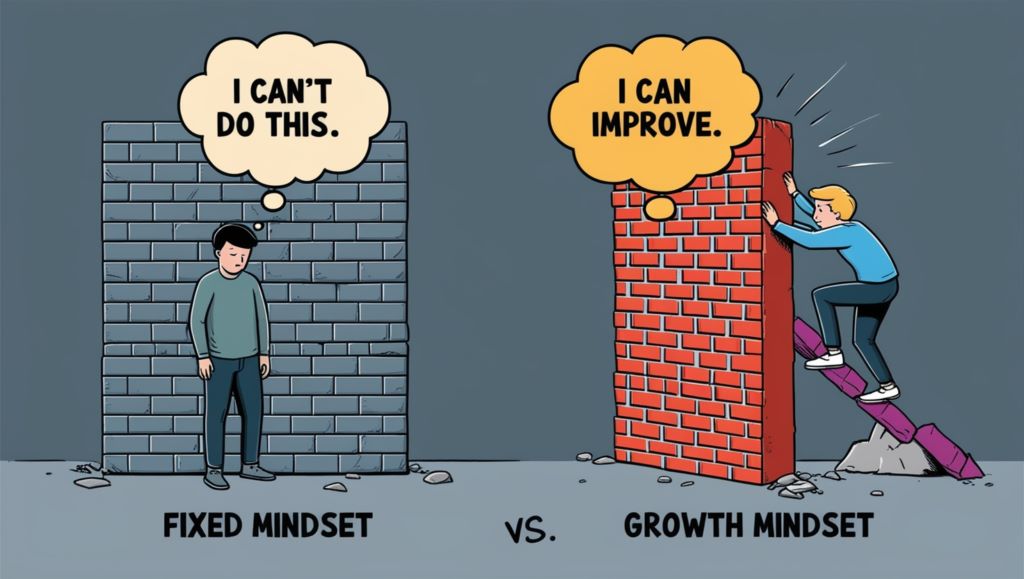Success can be seen as the ability to accomplish your goals in life, whatever those may be. Rather than a final destination, success is more of a journey that enables you to develop the necessary skills and resources to thrive.
Psychologist Carol Dweck’s research introduces two fundamental mindsets that influence how people perceive themselves and their abilities: the fixed mindset and the growth mindset. Here are 11 Psychological Tips on How to achieve success
Table of Contents
Fixed vs Growth Mindset

- Fixed Mindset: Individuals with a fixed mindset believe that traits like intelligence are static and unchangeable. They often think that success is a result of innate talents rather than hard work. As a result, they are more likely to give up when faced with challenges, believing they lack the inherent abilities to succeed.
- Growth Mindset: On the other hand, those with a growth mindset believe that they can develop and enhance their abilities through effort and perseverance. When faced with difficulties, they seek ways to improve and continue striving toward their goals.
How to Cultivate a Growth Mindset
- Believe in Effort: Embrace the idea that your efforts can lead to meaningful growth.
- Learn Continuously: When challenged, focus on acquiring the knowledge and skills needed to overcome obstacles.
- View Failures as Lessons: Understand that failure is an opportunity to learn and adapt, not a reflection of your abilities.
Enhance Your Emotional Intelligence

While intelligence has traditionally been considered a key factor in achieving success, emotional intelligence (EQ)—the ability to understand and manage emotions—might be even more important.
- Understand Your Emotions: Pay close attention to your feelings and their origins.
- Manage Your Reactions: Approach situations objectively and seek a healthy outlet for your emotions.
- Listen Actively: Go beyond just hearing others by interpreting their body language and nonverbal cues.
Develop Mental Toughness

Mental toughness refers to the resilience and determination to continue pursuing goals even in the face of setbacks. Individuals with this trait view challenges as opportunities for growth, believe in their ability to control their destiny and stay committed to their objectives.
Tips to Build Mental Toughness
- Believe in Yourself: Replace negative self-talk with positive affirmations.
- Persevere: Even when progress is slow, continue working on improving your skills.
- Practice Self-Care: Regularly check in with yourself to ensure your physical and mental well-being.
- Seek Growth Opportunities: Embrace new challenges as opportunities for personal discovery.
Strengthen Your Willpower

A landmark study that followed a group of highly intelligent children over several decades found that perseverance and willpower were key predictors of long-term success. Although these traits are often part of one’s personality, they can also be developed.
Strategies to Build Willpower
- Use Distractions: When faced with temptation, divert your attention to something else.
- Practice Regularly: Start with small, manageable goals to build up your willpower over time.
Focus on Intrinsic Motivation
Intrinsic motivation—driven by personal satisfaction and interest—often leads to higher quality work and long-term success. While external rewards can be motivating, they may not be as effective as doing something you find meaningful.
Ways to Cultivate Intrinsic Motivation
- Challenge Yourself: Set goals that are achievable yet not too easy.
- Stay Curious: Continuously seek out things that capture your interest.
- Take Control: Look for ways to actively influence outcomes in your pursuits. Set Realistic and Achievable Goals
Be Specific: Set well-defined goals, such as “I will spend 20 minutes a day learning a new language” instead of a vague goal like “I will learn French.”
Break Down Goals: Divide larger goals into smaller, actionable steps to avoid feeling overwhelmed.
Cultivate Traits Linked to Success
Certain traits have been consistently linked to success, although they need to be present at balanced levels. Psychologists Ian MacRae and Adrian Furnham have identified six key traits associated with workplace success:
- Conscientiousness: Be thoughtful about the consequences of your actions and consider others’ perspectives.
- Acceptance of Ambiguity: Embrace uncertainty and adapt to change.
- Adaptability: Learn to adjust to new circumstances quickly.
- Courage: Take calculated risks, even when facing the possibility of failure.
- Curiosity: Stay eager to learn and explore new ideas.
- Healthy Competitiveness: Use competition to drive improvement without succumbing to envy. Build a Strong Social Support System
Success is often easier to achieve with the support of others. A strong social network can provide:
- Emotional Support: Comfort and empathy during challenging times.
- Esteem Support: Encouragement and confidence to keep moving forward.
- Informational Support: Guidance, mentorship, and resources to reach your goals. Avoid Burnout
Chronic stress can lead to burnout, diminishing your motivation and performance. To prevent this, practice self-care and address the underlying causes of your stress.
Prevent Burnout with These Strategies

- Prioritize Self-Care: Ensure you get enough sleep, eat healthily, and manage stress effectively.
- Reassess Your Goals: If your goals are causing undue stress, consider adjusting them to be more realistic.
Final Thoughts
Success doesn’t have a one-size-fits-all formula. By adopting the habits and strategies of successful people, you can enhance your ability to achieve your goals. Focus on cultivating these traits, mindsets, and behaviors, and you may find yourself well on the path to the success you desire.
